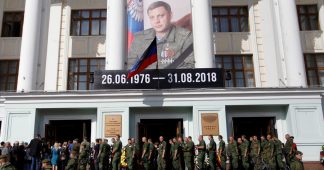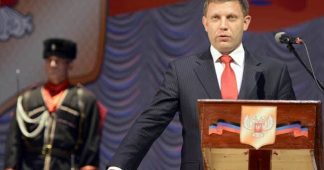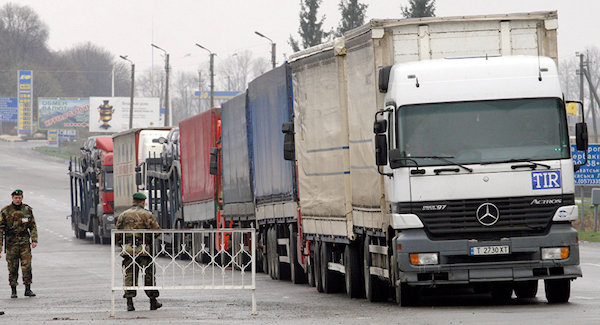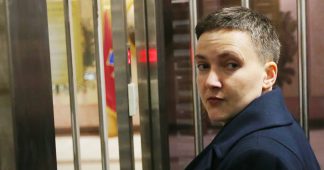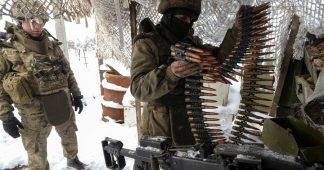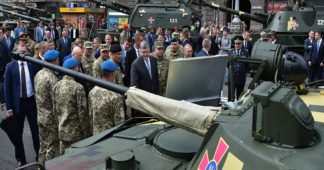Leader of breakaway republic in Ukraine assassinated
By Andrea Peters
7 September 2018
Last Friday’s assassination of Alexander Zakarchenko, the head of the breakaway Donetsk People’s Republic (DNR) in eastern Ukraine, is exacerbating already heightened tensions between Russia and the Western imperialist powers. The 42-year-old leader of the Russian-backed rebel state died in an explosion at a café in Donetsk on the evening of August 31.
According to official sources, an improvised explosive device was placed in the restaurant before the prime minister arrived for dinner. Zakharchenko’s body guard was also killed. Twelve others, including the minister of finance, were injured. Dmitri Trapeznikov, Zakharchenko’s deputy, has been appointed temporary head of government, and the republic’s parliament will vote on holding new elections this Friday. Over 100,000 people attended the slain politician’s funeral on Sunday.
The DNR and Moscow blame Kiev for the attack. Maria Zakharova, a spokeswoman for Russia’s Foreign Ministry, denounced the Ukrainian government of Petro Poroshenko on Friday for “implementing a terrorist scenario” and resorting to “bloody means.” An official press release decried the murder as an event that “runs along Kiev’s logic of a military solution to the internal Ukrainian crisis.” It warned, “Such actions carry the serious risk of destabilizing the situation in southeast Ukraine.”
Russian President Vladimir Putin, without directly accusing Ukraine of involvement, paid tribute to Zakharchenko and described his murder as a “dastardly crime.” The speaker of the DNR Parliament, Denis Pushilin, insisted that the murder was carried out by Kiev with the aid of US special operations forces.
The head of Ukraine’s security services, Igor Guskov, denied the country’s involvement. He stated that Zakharchenko’s death was either the result of infighting among warring factions inside the DNR or an act carried out by Russia, which wished to remove the allegedly troublesome Zakharchenko from power.
Moscow has dispatched investigators from its own Federal Security Services (FSB) to the DNR and called for an international investigation into the murder. The Organization for Security and Co-operation in Europe (OSCE) has said it is considering the matter. After initially circulating images of two suspects wanted by police on Wednesday, DNR officials declared that the individuals in question were no longer being sought.
Zakharchenko’s murder is one of a series of recent assassinations of prominent military and political figures in Ukraine’s two breakaway republics where there is a complex web of relationships between politicians, wealthy oligarchs, and state actors.
The fighting in the Ukraine’s southeast stems back to the US-backed, far-right coup in the country in February 2014. Viktor Yanukovych, Ukraine’s president, who was moving in the direction of closer ties with Moscow, was driven from power in a wave of protests and violence led by ferociously anti-Russian, Ukrainian nationalists with the support of Berlin and Washington.
As millions of ethnically Russian citizens fled Ukraine, a separatist movement took hold in the largely Russian-speaking eastern coal-mining region known as the Donbass. The DNR and its sister state, the Lugansk People’s Republic (LNR), supported by Russia, formed out of this conflict. Powerful sections of the American ruling class, which are braying for war with Russia, see the conflict in Ukraine, like that in Syria, as an important front.
After Zakharchenko’s murder, DNR officials declared a state of emergency in the region and placed the military on high alert. They said that Ukrainian armored vehicles had been seen advancing on Volnovakha-Dokuchaevsk, a frontline south of Donetsk.
Daniel Bezsonov, spokesperson for the DNR’s operational command, stated Sunday that large numbers of foreign mercenaries, including US and Canadian forces, had arrived in Ukraine and joined two of Kiev’s artillery and infantry brigades in preparation for a major attack. Eduard Bazurin, a DNR military leader, said that Ukrainian shock troops have also been deployed to the southeastern city of Mariupol. The Ukrainian military also stated last weekend that anti-government attacks were escalating in the Donbass.
On Monday, joint Ukrainian-NATO exercises started in the western Ukrainian city of Lvov. American Ambassador to Ukraine Marie Yovanovitch declared at the opening ceremony that the ten countries involved “stand in solidarity with Ukraine for Ukrainian security, Ukrainian sovereignty, and Ukrainian territorial integrity.”
The murder of Zakharchenko may be the death knell of the Minsk II peace accords, agreed in 2015 between Ukraine, Russia, France, and Germany (known as the Normandy Four), and to which Zakharchenko was a signatory. That agreement, which was supposed to stop the fighting and grant the DNR and LNR limited recognition, has been repeatedly violated by the Ukrainian army and far-right paramilitary stationed on the border.
Russian Foreign Minister Sergei Lavrov declared Saturday that forthcoming talks among the Normandy Four to discuss the implementation of Minsk II were now “impossible.” Zakharchenko’s murder “is a provocation, a frank one, aimed at frustrating the implementation of Minsk accords. Although, Kyiv authorities never fulfilled them anyway,” he added.
While France and Germany initially insisted that the assassination not be used to further escalate tensions, on Wednesday the European Union (EU) extended sanctions against 154 Russian individuals and 44 Russian companies over the country’s involvement in Ukraine. The number of sanctioned individuals dropped by 1, as the now-dead Zakharchenko was removed from the list.
